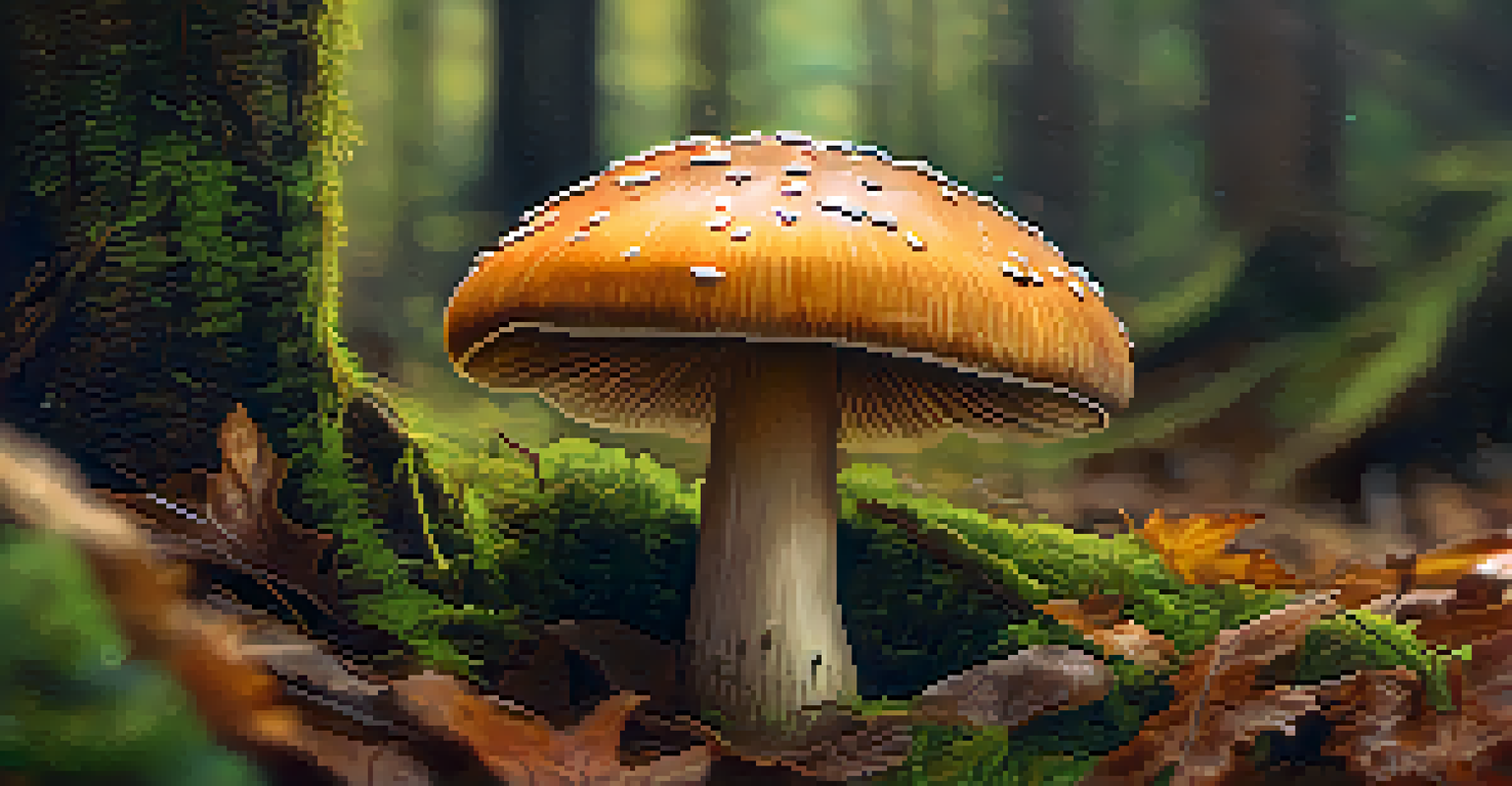Entheogens and Mental Health: A Holistic Approach

What Are Entheogens and Their Cultural Significance?
Entheogens are substances that inspire a sense of the divine, often used in spiritual or religious contexts. These natural compounds, such as psilocybin mushrooms and ayahuasca, have been part of various cultures for centuries. By bridging the gap between the physical and spiritual realms, they offer unique experiences that can lead to profound insights about oneself and the universe.
The greatest discovery of my generation is that a human being can alter his life by altering his attitude.
The use of entheogens dates back thousands of years, with indigenous peoples incorporating them into rituals and ceremonies. This deep-rooted tradition highlights their importance in promoting mental well-being and fostering community connections. Understanding this historical context can help us appreciate their potential value in contemporary mental health treatments.
In recent years, there has been a resurgence of interest in these substances from both scientific and therapeutic perspectives. Researchers are exploring how entheogens can aid in treating conditions like depression, PTSD, and anxiety. This renewed focus invites a broader conversation about holistic approaches to mental health, integrating ancient wisdom with modern science.
The Science Behind Entheogens and Mental Health
Research into entheogens is revealing their potential benefits for mental health. Studies have shown that compounds like psilocybin can promote neuroplasticity, enabling the brain to form new connections and pathways. This can be especially beneficial for individuals struggling with rigid thought patterns often seen in depression and anxiety.

Moreover, entheogens can facilitate deep introspection, allowing users to confront and process emotional traumas. This therapeutic journey can result in significant breakthroughs, helping individuals gain clarity and emotional relief. Such experiences are often described as transformative, leading to lasting changes in perspective and behavior.
Entheogens and Mental Health
Entheogens show potential in treating mental health conditions by promoting neuroplasticity and facilitating deep introspection.
However, it's essential to approach this area of research with caution. While promising, the science surrounding entheogens is still in its infancy, and more rigorous studies are needed. By understanding both the potential and the limitations, we can better integrate these substances into holistic mental health treatments.
Integrating Entheogens into Holistic Mental Health Practices
Holistic mental health approaches consider the whole person, addressing emotional, physical, and spiritual well-being. Integrating entheogens into these practices can enhance therapeutic outcomes by providing individuals with new tools for self-discovery. This can be particularly effective when combined with traditional therapies such as cognitive-behavioral therapy (CBT) or mindfulness techniques.
We do not see things as they are, we see them as we are.
For instance, a guided session with an entheogen can create a safe space for individuals to explore deeply rooted issues. This experience can be complemented by therapeutic discussions afterward, allowing for integration of insights gained during the session. Such a comprehensive approach can empower individuals on their healing journeys.
It’s important to note that these practices should be conducted under professional supervision. Qualified guides can help ensure safety and provide support throughout the process. This collaborative effort can maximize the benefits while minimizing potential risks associated with entheogen use.
Potential Risks and Ethical Considerations
While entheogens offer exciting possibilities, they also come with risks that cannot be overlooked. Misuse or unsupervised use can lead to adverse psychological effects or exacerbate existing mental health conditions. It’s crucial for individuals to approach these substances with respect and caution, understanding their potential consequences.
Ethical considerations also play a significant role in the discussion around entheogens. Many traditional practices have been co-opted or commercialized, raising concerns about cultural appropriation and the exploitation of indigenous knowledge. Engaging with these substances should be done thoughtfully, ensuring respect for their origins and the cultures that have used them for centuries.
Cultural Significance of Entheogens
These substances have a rich history in various cultures, emphasizing their role in spiritual practices and community connection.
To navigate these complexities, ongoing dialogue and education are essential. By fostering a respectful and informed approach to entheogens, we can work towards responsible integration into mental health practices while honoring their rich cultural heritage.
Real-Life Stories: Healing Through Entheogens
Many individuals have shared transformative stories of healing through entheogens. For example, a veteran struggling with PTSD found profound relief after participating in a guided psilocybin session. This experience not only alleviated his symptoms but also provided him with a renewed sense of purpose and connection to others.
These personal accounts highlight the potential of entheogens to catalyze change in people’s lives. Participants often report feelings of interconnectedness, heightened empathy, and a greater understanding of their emotional struggles. Such experiences can lead to lasting improvements in mental health, fostering resilience and hope.
However, it’s important to remember that everyone’s journey is unique. What works for one person may not work for another, emphasizing the need for personalized approaches in mental health treatment. Listening to these stories can inspire others to explore the possibilities within themselves, paving the way for healing and growth.
The Role of Community in Entheogenic Experiences
Community plays a vital role in the healing process when it comes to entheogenic experiences. Many individuals report feeling a deep sense of belonging and support during and after their journeys. Sharing insights and experiences with others who have undergone similar explorations can create a powerful network of understanding and healing.
Group settings, such as retreats or ceremonies, can enhance the experience by providing a safe space for exploration and connection. These communal settings often foster an atmosphere of trust and vulnerability, allowing participants to share their journeys openly. This collective experience can amplify the benefits of entheogen use, promoting a sense of unity and shared growth.
Community's Role in Healing
Shared experiences within supportive communities enhance the healing process for individuals using entheogens.
Additionally, establishing community support networks can help individuals integrate their experiences into their daily lives. These networks can offer ongoing encouragement and understanding, reinforcing the lessons learned and helping individuals navigate any challenges that may arise post-experience.
Looking Ahead: The Future of Entheogens in Mental Health
The future of entheogens in mental health looks promising as research continues to expand. As more studies validate their therapeutic potential, we may see a shift in public perception and policy regarding these substances. This could lead to greater accessibility and acceptance of entheogens as legitimate tools for mental health treatment.
Furthermore, the integration of entheogens into mainstream mental health practices could inspire a more holistic approach across the field. By combining traditional therapies with the insights gained from entheogenic experiences, mental health professionals can offer more comprehensive care that addresses the root causes of distress.

Ultimately, the goal is to create a balanced and informed dialogue around entheogens. By combining scientific research, personal experiences, and ethical considerations, we can pave the way for a future where entheogens play a positive role in mental health, promoting healing and well-being for all.